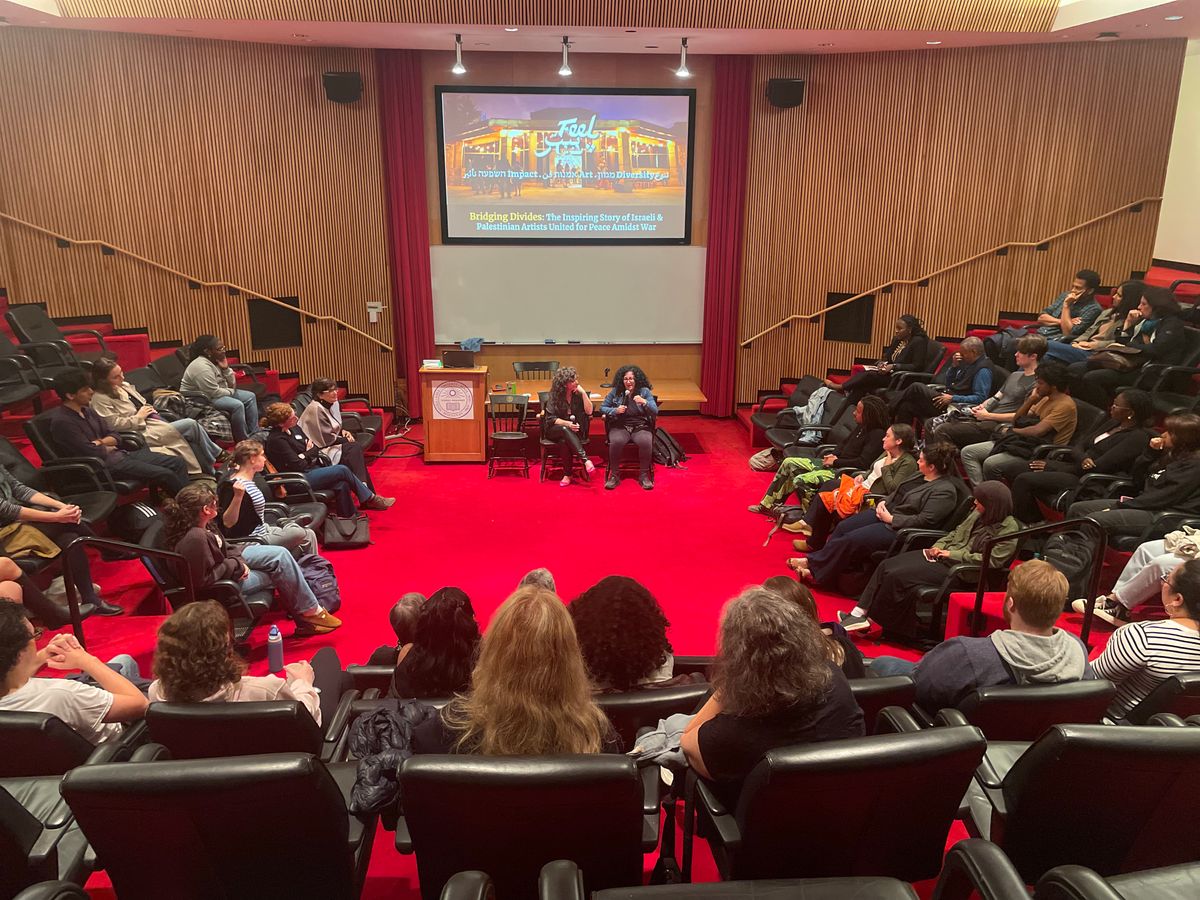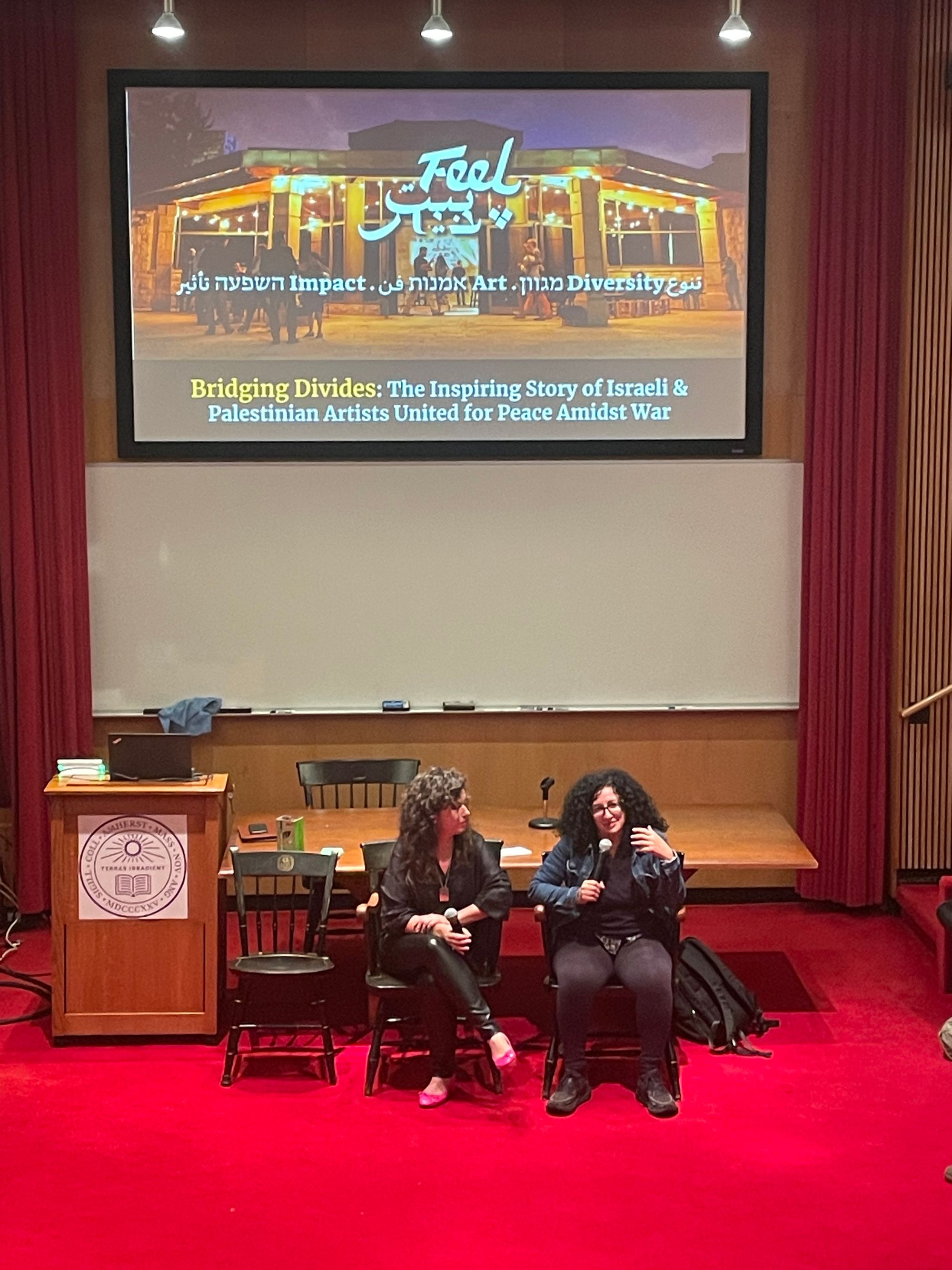Palestinian-Israeli Organizations Offer Visions of Peace
Representatives from two organizations that foster conversation between Israelis and Palestinians visited campus last week. They shared their experiences in bringing people together over shared grief and art.

Last week, the Center for Restorative Practices brought two Palestinian-Israeli peace organizations to campus.
Parents Circle – Families Forum brings Israeli and Palestinian bereaved families together. FeelBeit gathers artists in a cultural house on the seam-line of East and West Jerusalem. Leaders of both — traveling from Bethlehem, Tel Aviv, and Jerusalem — spoke in Converse Hall’s Red Room.
The events are the first in a series focused on the experiences of Palestinians and Israelis working in the region.
They were co-sponsored by the Center for Restorative Practices, the Office of Diversity, Equity, and Inclusion, Student Affairs, and Religious and Spiritual Life.
Parents Circle – Families Forum
Layla Alsheikh and Robi Damelin spoke in the Red Room last Tuesday. Both Alsheikh and Damelin are longtime members of Parents Circle, which brings over 750 Palestinian and Israeli families who have lost family members to the ongoing conflict together for “Dialogue Meetings.”
Damelin began her talk by addressing the size of the crowd, which was small — the number of students there hovered around ten, with some coming and going.
“I so wish this auditorium was full of people,” Damelin said. She voiced concern that the small numbers were due to polarization on campuses. “It’s easy … to pour our conflict into your country,” she said, but she wanted those engaged in the conversation on all sides to attend the talk.
Each of the speakers recounted how they became involved in Parents Circle, telling their stories with humor and hope.
Alsheikh, born to a Palestinian father in Jordan, fulfilled a lifelong “dream to return to Palestine” in 1999 when she and her husband moved to Bethlehem in the West Bank, where they had two children during the Second Intifada. In the early morning of April 11, 2002, her six-month-old son Qussay was struggling to breathe after Israeli soldiers launched a tear gas attack on their village. Alsheikh attempted to rush Qussay to the hospital, but Israeli soldiers prevented her from taking him there for over five hours. Qussay died later that night due to this delay in treatment.
Sixteen years later, when a friend brought up the idea of going to a Parents Circle meeting with Israelis, she said, “Are you crazy?”
Throughout that time, though, Alsheikh said she “didn’t seek revenge.” Reluctant to inadvertently bring her other children into a “cycle of violence,” she had never told them the story of how Qussay had died. Reminding her of this, her friend convinced her to attend her first Parents Circle meeting in Bethlehem.
Alsheikh said that, prior to the meeting, she had never met Israelis who weren’t soldiers or West Bank settlers. She described how she initially wanted to leave when the Israeli members entered the room, but then “I saw [the Israeli and Palestinian families] start to laugh and hug each other like a family member.” She decided to stay.
“We share the same pain,” she said, “Nothing [is] worse than losing a child … Someone could understand me from looking in my eyes.”
Damelin’s involvement with Parents Circle began soon after her son David was killed by a Palestinian sniper while on military reserve service in the West Bank.
When soldiers came to tell Damelin the news of her son’s death, she recalls that the first thing she said was “You may not kill anybody in the name of my child.” She went to her first Parents Circle meeting soon after.
“A reconciliation process is an integral part of any political solution,” Damelin said. She emphasized the importance of understanding the perspectives of children growing up in Gaza, for example — and even of the man who killed her son, whose identity she was informed of years after David’s death.
“[Finding out his name] was the test. [It’s] easy to go around the world talking about peace … reading bad poetry as NGOs tend to do,” she said, but what would she do with this information?
Damelin wrote to the man and his family, asking if they’d be willing to talk. He wrote back after three years, and told her to stay away from him, detailing his killing of other Israelis.
“He went on a path of revenge,” Damelin said, adding that she understood how it came from his pain. She didn’t want to wait for an apology from him. “I gave up being a victim,” she said, “That’s such a gift.”
Damelin and Alsheikh also discussed changes to Parents Circle’s operations since Oct. 7.
Damelin said that the first meetings during the war were difficult because members were “living in different worlds” due to differing media environments. Now, “the trust has to be so deep,” she said.
That being said, almost all the families that were in Parents Circle have stayed in the organization during the war, throughout which many Palestinian members have lost numerous family members in Gaza.
While the Israeli government has banned Parent’s Circle from schools, Damelin said many schools have defied instructions and continued to support Parents Circle.
In Damelin’s words, Parents Circle is “not a political organization” and is not affiliated with a specific party, but “anyone who’s working for peace is a political person.”
During the Q&A, one attendee directed a question specifically to Alsheikh: “How can you reconcile genocide and occupation as you do this work with Israelis?”
Alsheikh responded: “Not everything I can forgive.” She described her own experiences with army-sanctioned settler violence in the West Bank and emphasized that she feels the work of Parents Circle does not require her to forgive or forget such experiences.
Damelin also directly encouraged students to look to NGOs on the ground “looking for an end to the occupation, an end to the war,” saying that was “better than making statements.”
“If you want to divest, that’s fine,” she said, “But take the money from divesting and put it into peace movements.”
FeelBeit
Two days later, the co-founders of FeelBeit, an Israeli-Palestinian cultural house in Jerusalem, spoke about the importance of art and human connection to forging a peaceful future.
Riman Barakat and Karen Brunwasser founded FeelBeit in 2020 as an art-focused space to bridge divides between Israelis and Palestinians in Jerusalem by “insist[ing] on shared humanity.” As they put it, outside FeelBeit, many of its members are unequal in the eyes of the law and culture, but inside, they aim to create something different.

The name FeelBeit itself reflects this mission, as it is a combination of English, Arabic, and Hebrew and conveys the phrase “to feel at home.” The organization’s logo includes a custom font that allows both Hebrew and Arabic readers to read the word at the same time.
“FeelBeit is not just about not killing each other,” Brunwasser and Barakat said. “We really feel like we have something to give each other.”
Barakat and Brunwasser said that shared commitments to art and the city of Jerusalem, where Israelis and Palestinians live in close proximity, not only inspired them to co-found their organization but have continued to animate FeelBeit during this time of crisis.
Born and raised in Philadelphia, Brunwasser developed a passion for fighting prejudice after, at a young age, she learned that her grandparents were Holocaust survivors. She described falling in love with Jerusalem after visiting when she was sixteen, and moving there in 2005, towards the end of the Second Intifada. Despite many friends and family members urging her to move elsewhere, Brunwasser felt dedicated to helping the people of Jerusalem recover and build relationships across divides.
As a Palestinian born in East Jerusalem, Barakat explained that she is considered a “permanent resident” and not an Israeli or Palestinian citizen, meaning she doesn’t have all of the same rights as Jewish Israelis like Brunwasser. Barakat described a childhood shaped by violence and tension in the city. In fact, it was not until she read a poem in school that highlighted the emotions of an Israeli soldier that she began to realize the humanity of Israelis, spurring her involvement in programs that brought Israelis and Palestinians together.
Barakat met Brunwasser after the 2014 war in Gaza. Barakat was moved by Brunwasser’s art highlighting the stories of people across the city, and they soon became collaborators.
The two women spoke at length about what it was like to run FeelBeit after Oct. 7. They explained that the escalation of violence and social division in Jerusalem made their mission all the more crucial.
While they paused some of their usual programming after Oct. 7, they started a weekly series called “No Words” hosting diverse, intimate artistic performances. Brunwasser and Barakat said that the individuals who attended these events have forged bonds stronger than ever before.
They also highlighted how crucial their own relationships have been to the success of FeelBeit’s mission in the past year, asserting “the fact that we love each other and ourselves makes it easier for other people to walk in the door.”
Brunwasser and Barakat said that FeelBeit has been a “vibrant refuge” for the people of Jerusalem during the escalating war. As the two women put it: “When you’re there, it’s like you can breathe.”
Brunwasser mentioned that many people she’s spoken to in the U.S. expressed admiration for FeelBeit’s work, and expressed worries that such conversations are impossible within the U.S. The pair acknowledged those fears, but they nonetheless urged all those who “have the privilege of not being directly hit” by the war to take action and commit to uplifting humanity to forge a more peaceful future.





Comments ()